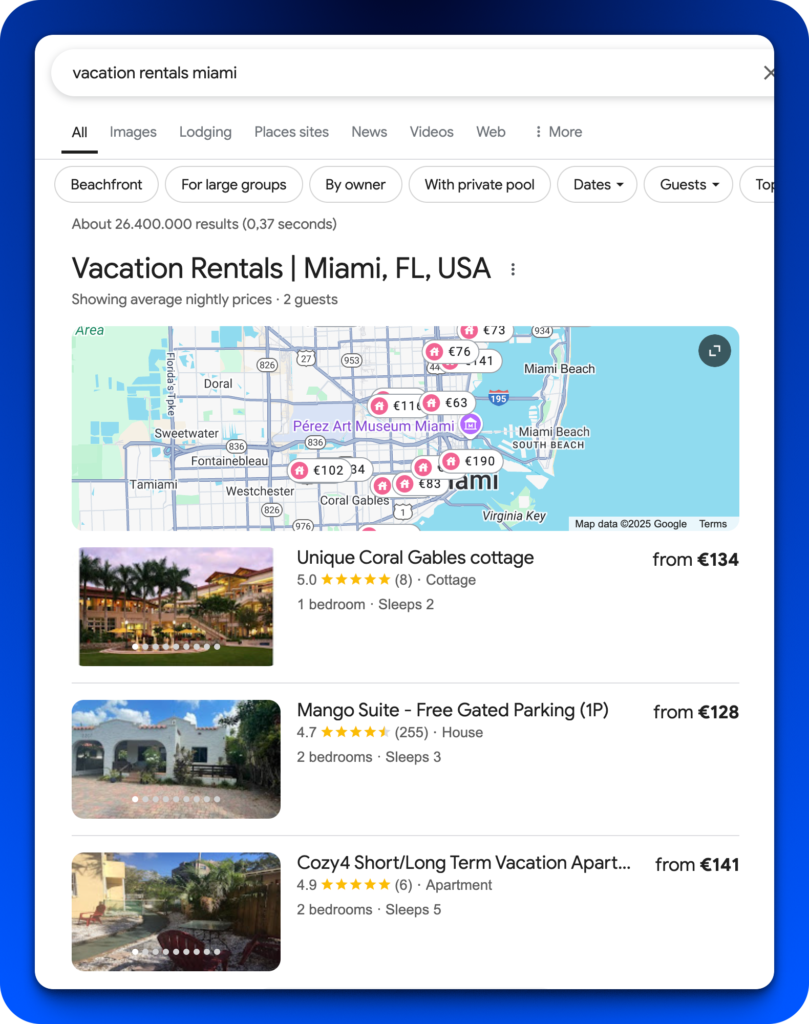Vacation rental SEO is a powerful tool for property owners looking to boost their online visibility and attract more bookings. By optimizing your website and content for search engines, you can reach potential guests actively searching for accommodations in your area. Effective vacation rental SEO can significantly increase your property’s visibility in search results, leading to more bookings and higher revenue.
Getting started with SEO might seem overwhelming, but it’s worth the effort. A well-optimized vacation rental website can outrank big booking platforms and attract direct bookings. This means more control over your business and lower commission fees. With the right strategies, you can improve your search rankings and stand out in a crowded market.
SEO for vacation rentals goes beyond just your website. It includes optimizing your local business listings, creating engaging content, and building a strong online presence. By focusing on these areas, you’ll be better positioned to capture the attention of travelers planning their next getaway.
Key Takeaways
Vacation rental SEO targets Google rankings and gives you full control over your content, while Airbnb SEO is limited to optimizing within their platform’s specific framework.
Google considers factors like backlinks and website authority for vacation rental SEO, whereas Airbnb primarily focuses on booking rates, response times, and guest reviews.
Investing in vacation rental SEO helps build your independent brand and reduces platform dependency, though it’s significantly more complex than Airbnb SEO.
Keywords are crucial for vacation rental SEO success, with “vacation rental [your location]” typically being the primary target keyword.
Effective on-page optimization requires both technical elements like meta tags and user-friendly content that keeps visitors engaged.
Local SEO is particularly important for vacation rentals and can deliver results faster than traditional SEO since you’re mainly competing with properties in your immediate area.
Who Am I?
But first, why should you trust me? Hi! I’m Theo, a passionate Airbnb strategist and marketing specialist who turns Airbnb properties into highly profitable ventures. I help hosts optimize their listings, master online marketing, and create exceptional guest experiences that keep the 5-star reviews flowing. When I’m not maximizing rental potential, you’ll find me hunting for the next hidden property gem.
As a seasoned online marketer specializing in SEO, I’ve mastered the secrets of vacation rental SEO and can definitely help your website climb to the top.
Understanding the Difference: Vacation Rental SEO vs. Airbnb SEO
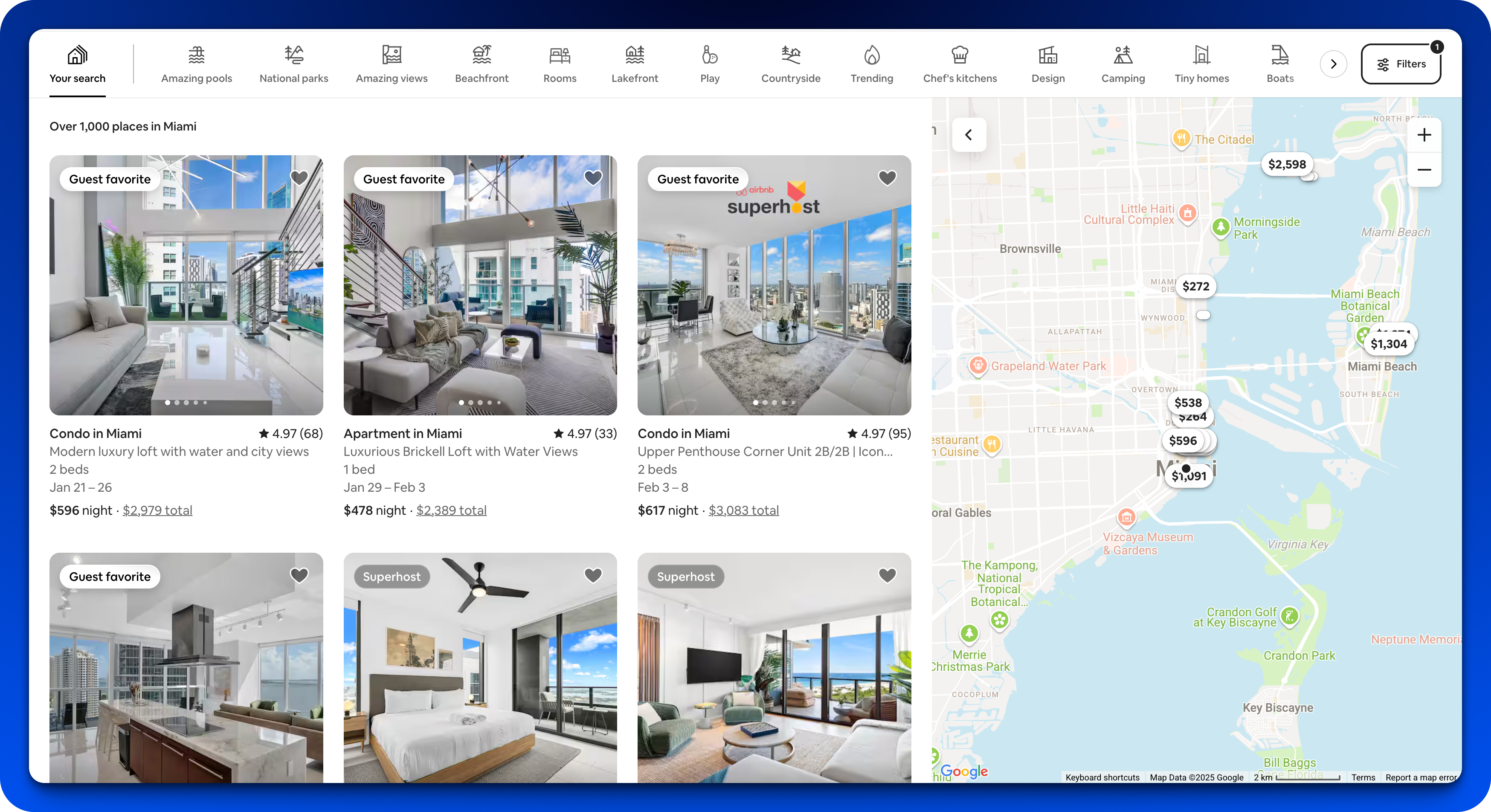
As someone who’s been in the trenches of vacation rental marketing for years, I’m super excited to break down something that often confuses property owners – the key differences between vacation rental SEO and Airbnb SEO. Trust me, knowing this stuff makes a huge difference in your booking strategy!
Here’s what you need to know about these two distinct approaches:
Platform: Listen up, because this is crucial – vacation rental SEO is all about getting those sweet Google rankings, while Airbnb SEO is strictly about ranking within Airbnb’s own ecosystem. I can’t tell you how many times I’ve seen hosts mix these up!
Control: Here’s the real deal – with vacation rental SEO, you’re basically the captain of your own ship. You’ve got complete control over your website’s content, how it’s structured, and all those technical bits that make search engines happy. On Airbnb? Well, you’re playing in their sandbox, which means you’re limited to what they allow.
Ranking Factors: Now, this is where things get really interesting! Google’s looking at stuff like those valuable backlinks (you know, when other websites link to yours), your overall website authority (which takes time to build, not gonna lie), and the quality of your content. Meanwhile, Airbnb keeps it simpler – they’re all about your booking rate, how many people click on your listing, how quick you are with those responses, and what your guests are saying in their reviews.
Long-term Benefits: Here’s something I seriously wish someone had told me earlier – investing in vacation rental SEO is like building your own little empire. You’re creating a brand that’s yours and reducing your dependence on other platforms. With Airbnb SEO, you’re essentially improving your position within their world only.
Direct Bookings: Here’s a game-changer – vacation rental SEO opens up the door to those sweet, commission-free direct bookings. When guests find you through Google, they’re landing straight on your website, which means you’re not paying those platform fees that can eat into your profits. With Airbnb SEO, every single booking comes with their service fee attached – there’s just no way around it.
OTA Independence: Let me drop some real talk here – relying solely on Airbnb or any other OTA (Online Travel Agency) is like putting all your eggs in one basket. With vacation rental SEO, you’re building your own independent online presence, protecting yourself from platform policy changes, fee increases, or algorithm updates that could affect your business overnight. Plus, you can still list on multiple platforms while also driving traffic to your own website, giving you way more flexibility in how you run your business.
Important Note: I’ve got to be straight with you – vacation rental SEO is no walk in the park. It’s significantly more complex than Airbnb SEO, with tons of ranking factors to consider. If you’re just starting out, you might find Airbnb SEO more manageable since it mainly focuses on three key areas: your booking rate, click-through rate, and those all-important guest reviews.
Think of it this way – Airbnb SEO is like cooking with a recipe, while vacation rental SEO is like being a chef who needs to understand every ingredient and technique. Both can get you great results, but they require different levels of expertise and commitment.
Remember, folks – this isn’t about choosing one over the other. It’s about understanding how each works so you can make smart decisions for your business and make both strategies work!
1. Keyword Research and Optimization
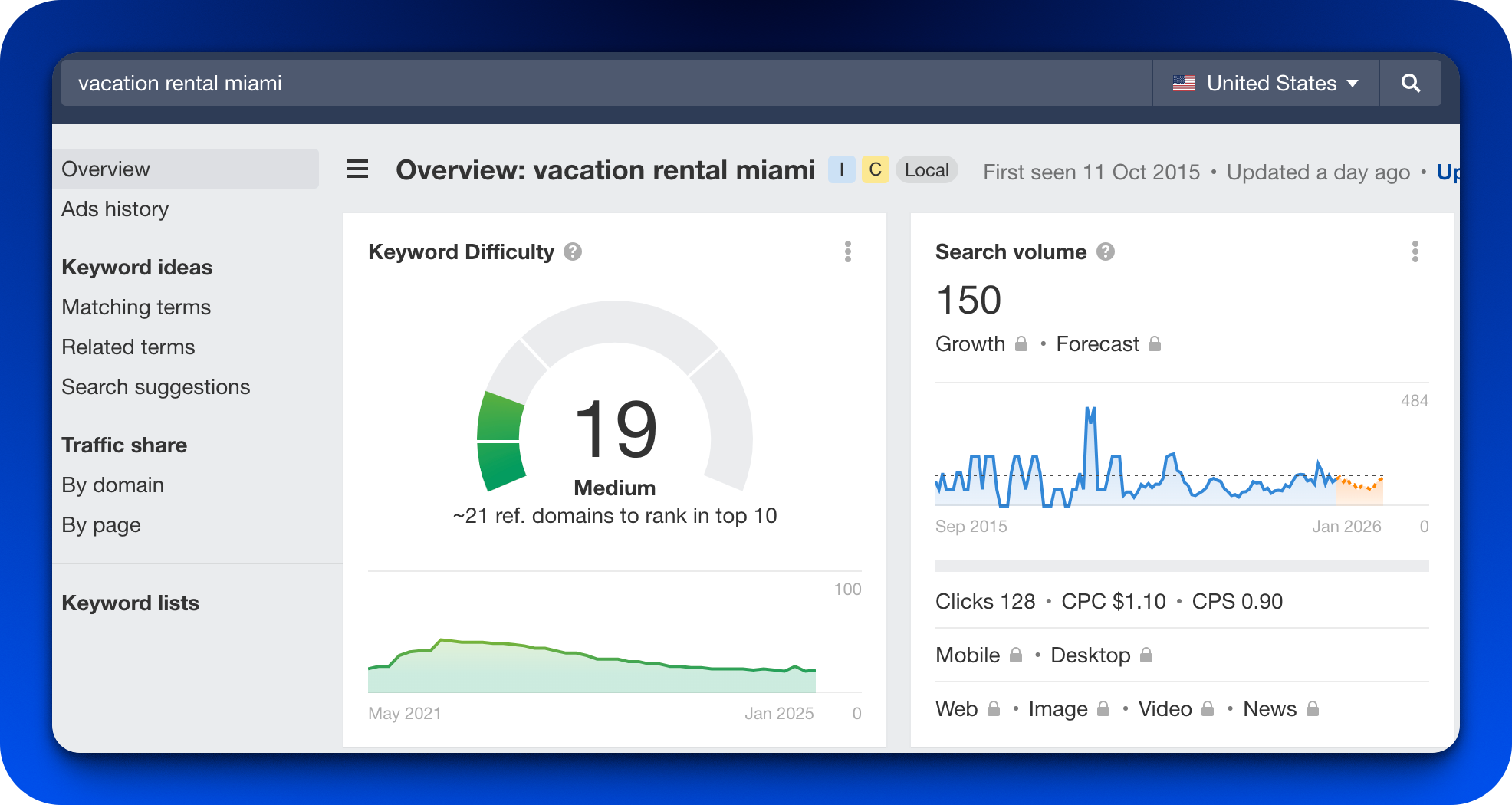
I’m pumped to share some real talk about keywords – they’re basically the foundation of your SEO strategy!
When you’re trying to get your vacation rental noticed online, keywords are your best friends. They’re those magical phrases that potential guests type into Google when they’re dreaming about their next getaway. But here’s the thing – it’s not about cramming your website with every popular term you can think of (that’s so 2010!). Instead, you need to find that sweet spot between popular search terms and those super-specific phrases that perfectly describe your property.
How This Impacts Vacation Rental SEO:
This is where it gets good! When you nail your keyword strategy, you’re essentially speaking the same language as your future guests. This means your property shows up when they’re actually looking for it (mind-blowing, right?). The better you get at this, the more qualified traffic you’ll attract to your website. And trust me, qualified traffic is what leads to those precious bookings we’re all after.
Actionable Steps:
Use tools like Google Keyword Planner (free) or Ahrefs (paid) to identify relevant keywords for your vacation rental.
Analyze your competitors’ websites to discover keywords they’re targeting.
Create a list of keywords specific to your property and location.
Incorporate these keywords naturally into your website’s content, including titles, headings, content and meta descriptions.
Regularly review and update your keyword strategy to stay current with search trends.
Pro Tip: Your main keyword will typically be “vacation rental [your location]” – that’s your bread and butter right there. For digging deeper than primary keyword, both Ahrefs and Google Keyword Planner are absolute gems for understanding search volumes. Bonus point: Ahrefs will also tell you how tough it’ll be to rank for specific keywords, which is super helpful when planning your strategy.
2. On-Page Optimization Techniques
Let’s dig into the nuts and bolts of on-page search engine optimization! This is where we fine-tune every page of your vacation rental website to make search engines fall in love with it. But remember – while we’re trying to impress Google, we’re really writing for actual humans who might book your place
How This Impacts Vacation Rental SEO:
When your landing pages are properly optimized, you’re essentially giving search engines a crystal-clear roadmap of what your content is about. This helps them understand exactly where to show your property in search results. Plus, when your content is genuinely helpful and engaging, visitors stick around longer – and search engines absolutely love that!
Actionable Steps:
Optimize your page titles and meta descriptions with relevant keywords.
Use header tags (H1, H2, H3) to structure your content logically.
Include your target keywords naturally within the first 100 words of your content.
Use internal linking to connect related pages on your website.
Optimize image alt tags with descriptive, keyword-rich text.
Ensure your content is easy to read and provides value to potential guests.
Bonus Tip: Here’s something super effective – create a property-specific FAQ section. It’s perfect for naturally including those long-tail keywords while actually helping your potential guests! It’s like hitting two birds with one stone – you’re improving your SEO while answering real questions that might be stopping someone from hitting that ‘book now’ button.
Remember, the goal here isn’t just to rank well – it’s to create content that genuinely helps people make decisions about booking your property. Keep it real, keep it helpful, and those rankings will follow!
3. Technical SEO for Vacation Rental Websites
Technical SEO might sound scary, but it’s absolutely essential for your website’s success. Think of it as the foundation of your digital vacation rental business – it includes everything from how fast your website loads to whether it works properly on mobile phones.
You know what drives me nuts? When I’m trying to book a vacation rental and the website takes forever to load! Your potential guests feel the same way. Technical SEO covers your site speed, mobile-friendliness, URL structure, and how easily search engines can read your content. In today’s competitive market, having a technically sound website isn’t just nice-to-have – it’s crucial for turning browsers into bookers.
How This Impacts Vacation Rental SEO:
When your website’s technical elements are properly optimized, search engines can better understand and rank your content. A smooth-running site keeps visitors engaged and reduces bounce rates (that’s when people leave your site quickly without booking). Search engines notice these engagement signals and use them to determine your rankings.
Actionable Steps:
Conduct a technical SEO audit of your website using tools like Google Search Console (free) or Screaming Frog (freemium).
Optimize your site’s loading speed by compressing images and leveraging browser caching.
Ensure your website is mobile-responsive and provides a seamless experience across all devices.
Create and submit an XML sitemap to search engines to improve crawlability.
Use schema markup to provide search engines with detailed information about your vacation rentals.
Secure your website with HTTPS to protect user data and boost search engine trust.
Regularly monitor and fix any broken links or 404 errors on your site.
Here’s the real talk about technical SEO – it’s pretty complex and time-consuming. Start with the basics that make the biggest impact: mobile optimization and site speed. Don’t try to tackle everything at once – many property owners get stuck trying to perfect everything immediately.
4. Local SEO Strategies for Vacation Rentals
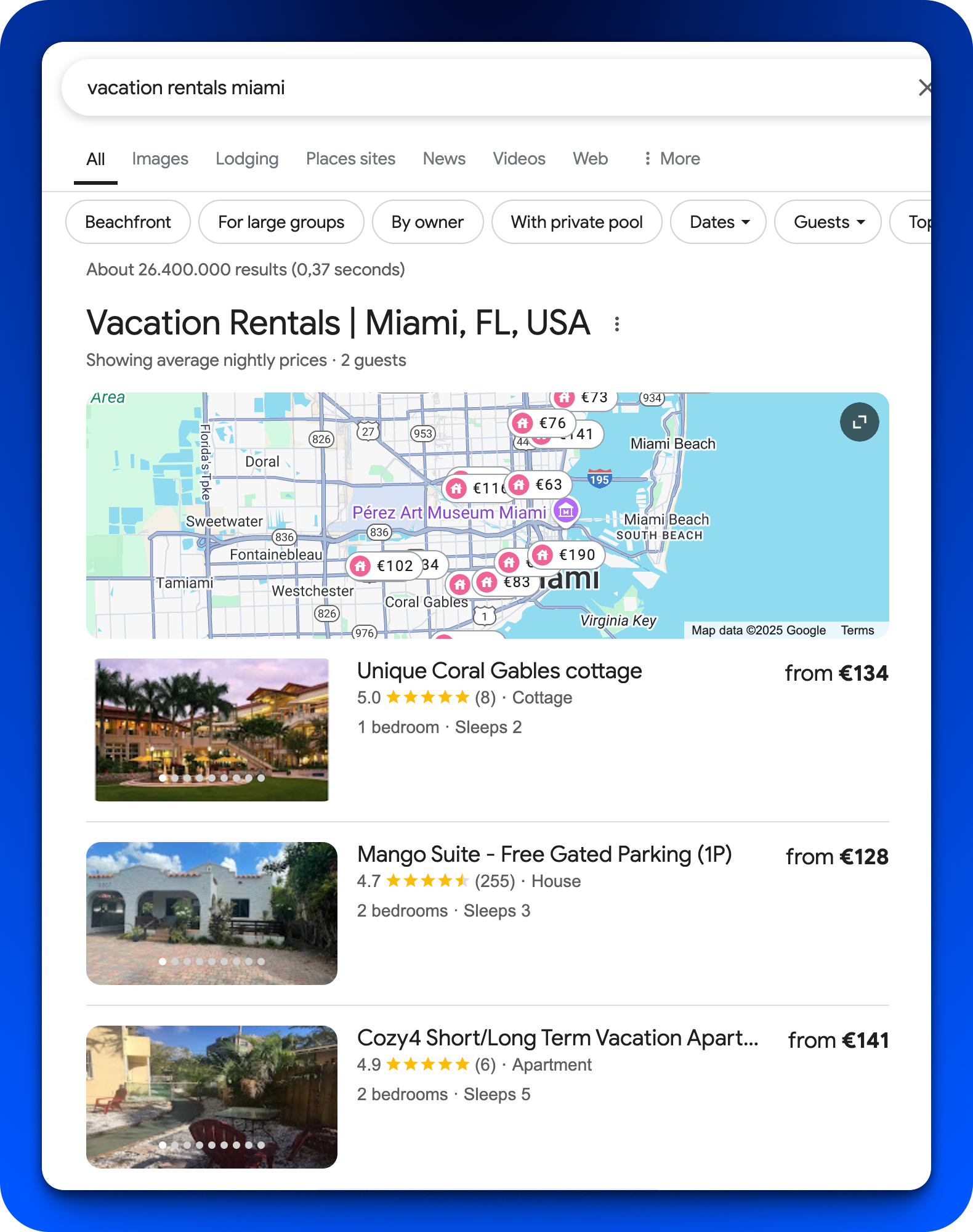
Local SEO is absolutely crucial for your vacation rental success. After working with hundreds of vacation rental owners, I can tell you that showing up in local search results is like having prime real estate on the digital high street. It’s all about optimizing your online presence for location-specific searches, and trust me, this is where the magic happens for vacation rentals.
When travelers search for “vacation rentals in [your location],” you want your property popping up right there in the local pack – that’s the map section at the top of Google’s search engine results pages’ results. This involves way more than just listing your property – we’re talking about managing your Google Business Profile (formerly Google My Business) and building up those precious guest reviews.
How This Impacts Vacation Rental SEO:
Getting your local SEO right means you’ll show up when it really counts – when travelers are actively searching for properties in your area. The best part? You’re competing with a much smaller pool of properties compared to traditional SEO. Plus, those positive reviews and accurate local listings send powerful trust signals to both potential guests and search engines.
Actionable Steps:
Claim and optimize your Google My Business listing with accurate information and high-quality photos.
Encourage guests to leave reviews and respond promptly to all feedback.
Ensure your property’s NAP information is consistent across all online directories and listings.
Create location-specific content that highlights local attractions and activities near your property.
Build relationships with local businesses and tourism boards for potential backlink opportunities.
Use local keywords in your website’s content, meta tags, and headings.
Here’s an insider tip: Local SEO is one of the few strategies that can actually deliver results relatively quickly for vacation rentals. While traditional SEO might take years to see significant results, local SEO can start bringing in bookings much sooner because you’re mainly competing with properties in your immediate area.
5. Content Marketing for Vacation Rentals
Content marketing isn’t just about writing blog posts – it’s about becoming the go-to resource for your area. Think about creating content that answers the questions your ideal guests are asking before they even book.
Whether it’s detailed guides about local attractions, seasonal event calendars, or insider tips about your area, great content helps potential guests envision their perfect stay at your property. The secret sauce? Creating content that’s genuinely helpful and matches what travelers are searching for online.
How This Impacts Vacation Rental SEO:
Quality content does multiple jobs for your SEO strategy. First off, it gives you natural opportunities to include those important keywords. But more than that, when visitors spend time reading your content, it signals to search engines that your site is valuable. Plus, great content tends to get shared and linked to by other websites, which is pure gold for your search rankings.
Actionable Steps:
Develop a content calendar that aligns with seasonal trends and local events relevant to your vacation rental.
Create in-depth guides about your local area, including attractions, restaurants, and activities.
Write blog posts that address common questions or concerns of vacation rental guests.
Use high-quality images and videos to showcase your property and local attractions.
Optimize your content for featured snippets by providing clear, concise answers to common questions.
Regularly update your content to ensure it remains accurate and relevant.
Here’s something most property owners don’t know: YouTube is seriously underutilized in vacation rental marketing. The competition is much lower than traditional search engine results, making it easier to rank for terms like “best things to do in [your city].” Since Google often displays YouTube videos in search results, you’re essentially getting double the exposure.
Each piece of content should serve a specific purpose in your guest’s journey – from dreaming about their vacation to actually booking it. And remember, while including keywords for vacation is important, your first priority should always be creating content that truly helps your potential guests.
6. Link Building for Vacation Rental Websites
Here’s the thing about link building – it’s absolutely critical for your vacation rental website’s success. Think of backlinks as digital word-of-mouth recommendations. When other respected websites link to yours, search engines see that as a big thumbs up.
But trust me on this one – you want quality over quantity every single time. Getting a link from your local tourism board or a respected travel blog carries way more weight than dozens of random links from irrelevant sites. Building these relationships takes time, but it’s worth every minute of effort you put in.
How This Impacts Vacation Rental SEO:
Strong backlinks are like rocket fuel for your website’s authority. When you’ve got high-quality links pointing to your site, you’re much more likely to rank higher for those competitive keywords that bring in serious booking inquiries.
Plus, these links often bring in direct traffic from people already interested in traveling to your area – talk about targeting the right audience! When you focus on getting links from travel sites and local businesses, you’re basically telling Google “Hey, we’re a legitimate player in this specific location.”
Actionable Steps:
Create high-quality, shareable content that naturally attracts backlinks.
Reach out to local tourism boards and request to be included in their accommodation listings.
Partner with local attractions or event organizers to offer package deals and earn mentions on their websites.
Contribute guest posts to travel blogs or industry publications.
List your property on reputable vacation rental directories.
Engage in local community initiatives or sponsorships to earn mentions from local news outlets.
Monitor your competitors’ backlink profiles to identify potential link opportunities.
Use tools like Ahrefs to track your backlink profile.
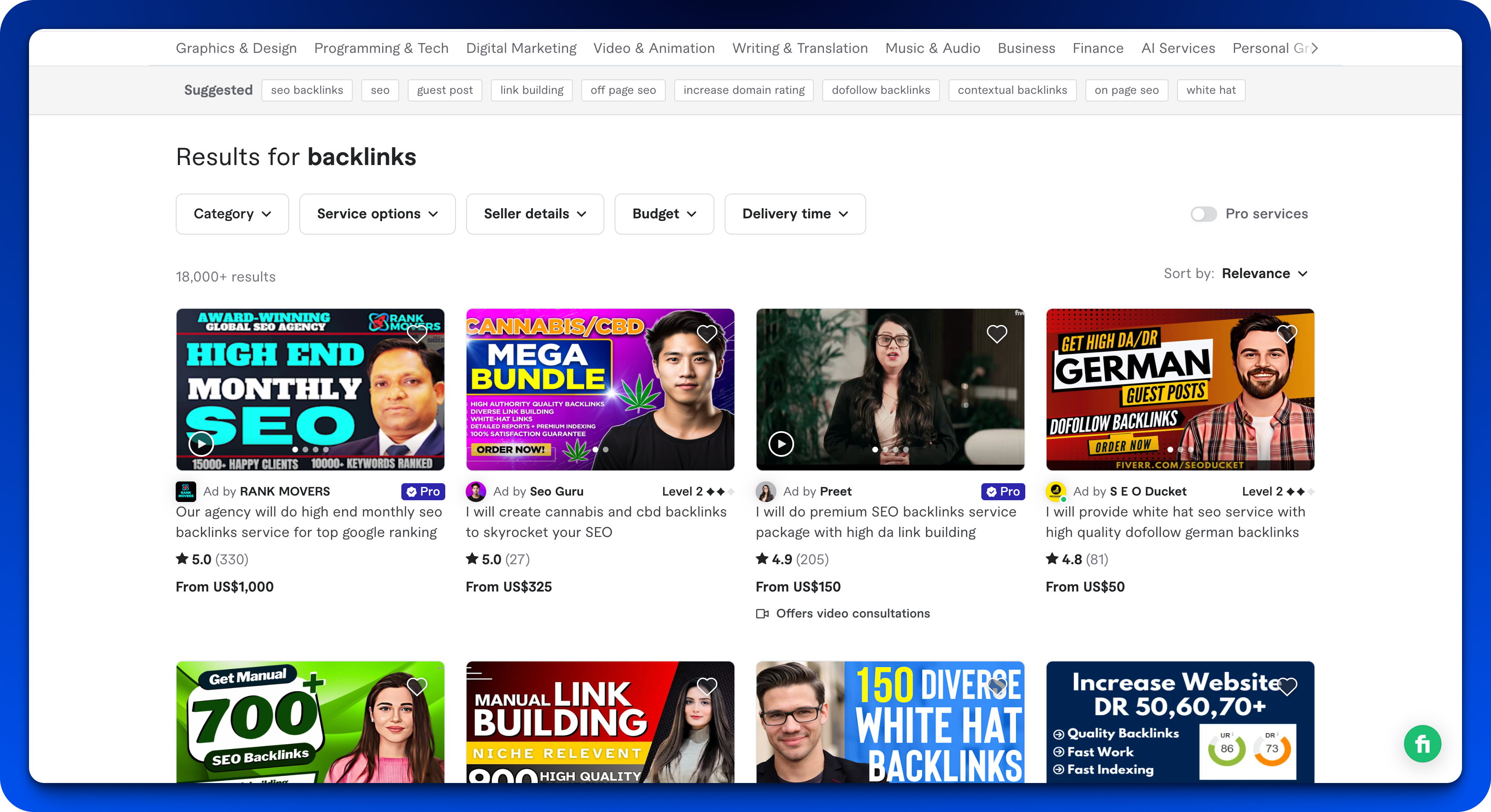
Quick warning about link building – I know those Fiverr backlink packages look tempting. They’re cheap and promise quick results. But seriously, avoid them like the plague. Those low-quality links can tank your rankings faster than you can say “Google penalty.”
7. Monitoring and Analyzing SEO Performance
Let’s dive into the data side of things. As a marketer who’s helped countless vacation rental owners, I can tell you that monitoring your SEO isn’t just some optional extra – it’s absolutely essential.
SEO isn’t a “set it and forget it” kind of deal (wouldn’t that be nice?). You need to keep a close eye on how your efforts are performing and be ready to adapt when things aren’t working. This means regularly checking your organic traffic, seeing where you rank for key terms, and tracking how many of those visitors actually turn into bookings.
How This Impacts Vacation Rental SEO:
Without proper monitoring, you’re basically flying blind with your SEO strategy. Regular analysis helps you spot what’s actually bringing in bookings and what’s just eating up your time. When you track your metrics consistently, you can catch any issues before they become major problems – like sudden drops in traffic or ranking positions.
And here’s the best part: over time, this data helps you make smarter decisions about where to focus your efforts for the biggest impact on your bookings.
Actionable Steps:
Set up Google Analytics and Google Search Console for your vacation rental website.
Define key performance indicators (KPIs) specific to your vacation rental business, such as organic traffic, booking conversions, and average search position.
Use SEO tools like Ahrefs to track your keyword rankings and backlink profile.
Regularly review your website’s performance, looking for patterns or anomalies in traffic and user behavior.
Conduct periodic content audits to identify underperforming pages and opportunities for improvement.
Monitor your competitors’ SEO performance to stay ahead of industry trends.
Create quarterly SEO reports to track progress and identify areas for improvement.
Stay informed about search engine algorithm updates and adjust your strategies accordingly.
Remember, SEO is constantly evolving. What works today might not work six months from now, so staying current with industry trends is super important for maintaining your rankings.
YouTube SEO: An Easier Path to Ranking
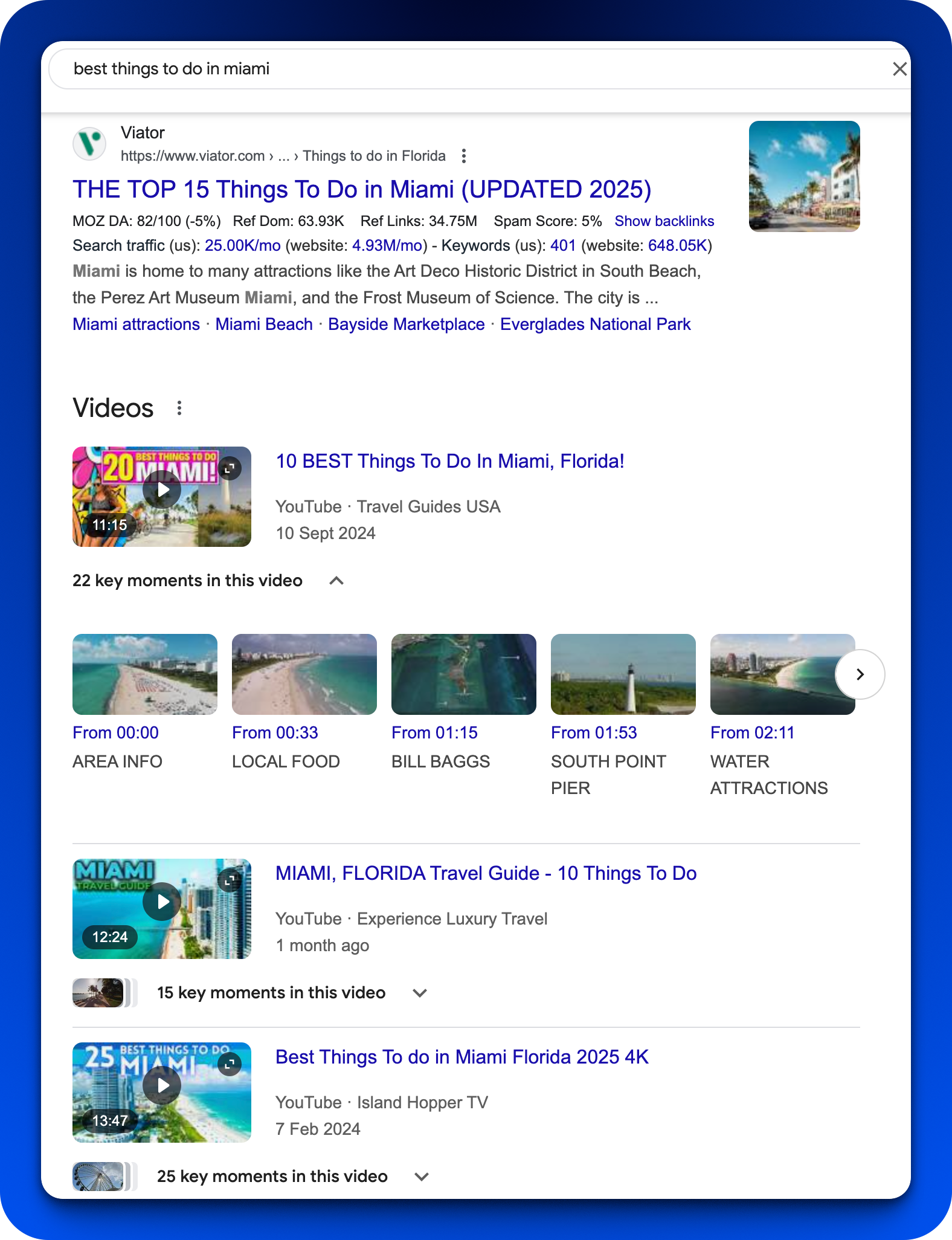
Here’s something most vacation rental owners don’t realize – YouTube can be your secret weapon for faster SEO wins. While traditional Google SEO often feels like watching paint dry (seriously, it can take forever to see results), YouTube offers a much quicker path to visibility. Their algorithm cares more about watch time and engagement, which you can influence pretty quickly with good content.
The really cool part? Your YouTube videos can show up in Google’s regular search results too. This means you’re getting double exposure in google search results, without double the work. Creating videos about your property, local attractions, or insider tips about your area can help you tap into both platforms’ search algorithms. Plus, video content gives potential guests a much better feel for what you’re offering – it’s like giving them a virtual tour before they even book.
Think about it – while your competitors are slugging it out for those tough Google rankings, you could be building an audience and driving bookings through YouTube. It’s an opportunity too good to pass up, especially in the competitive vacation rental market.
Resources for Learning Vacation Rental SEO
I’m excited to share some amazing resources that’ll help you master vacation rental SEO. Trust me, there’s a ton of free knowledge out there just waiting to be discovered!
First up, YouTube has become an incredible platform for learning SEO – and I mean seriously good stuff, not just basic tips. The platform is packed with detailed video tutorials covering everything from technical SEO to content optimization strategies specifically for local SEO. What’s super cool is that you can pause, rewind, and practice these techniques at your own pace.
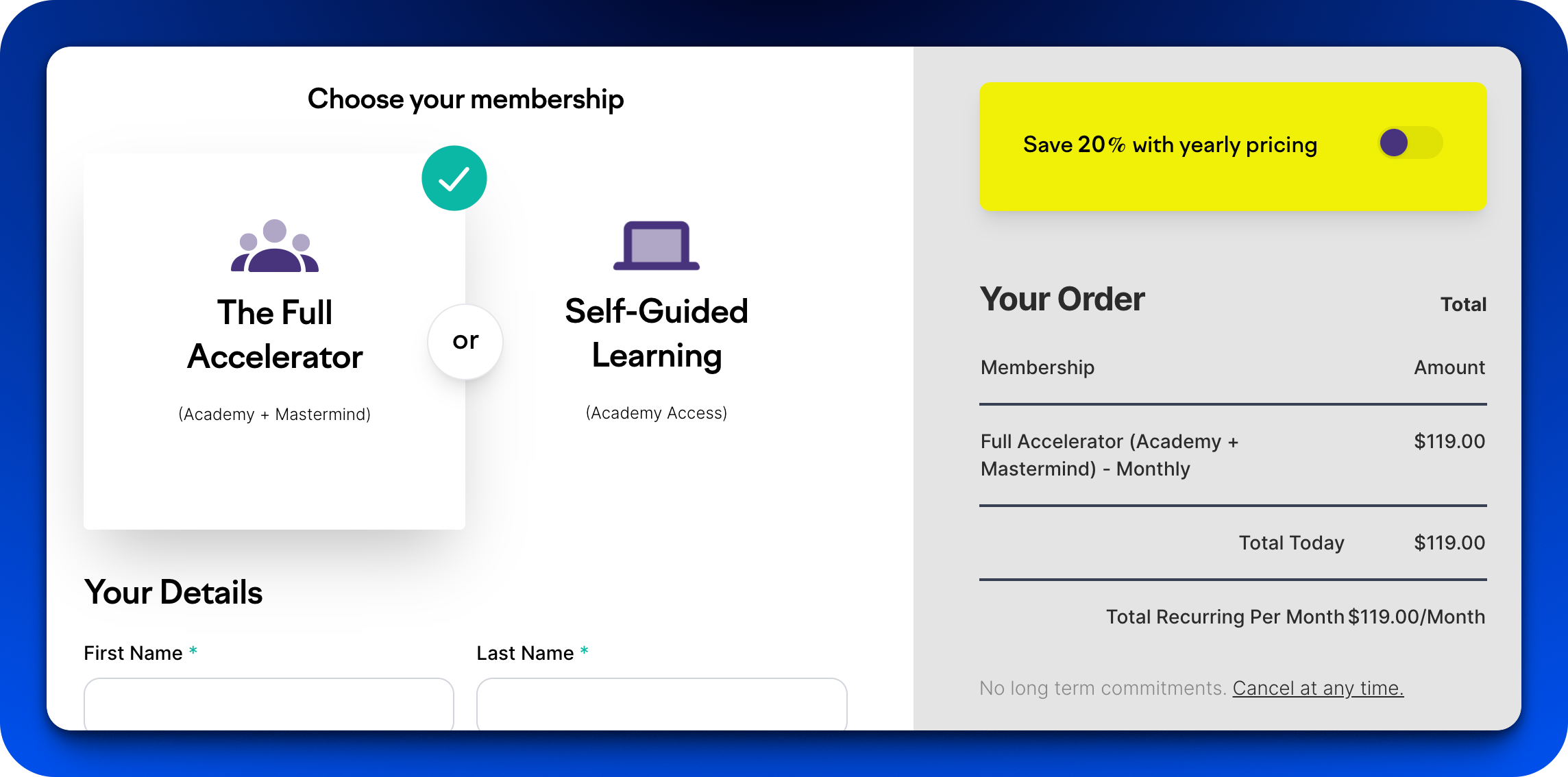
For those ready to dive deeper (and I mean really deep) into the SEO world, Traffic Think Tank is definitely worth checking out. Now, heads up – it’s a paid community, but here’s what you’re getting:
Access to comprehensive SEO courses
Expert guidance from seasoned professionals
Specific strategies focused on local SEO (which is huge for vacation rentals!)
Regular updates on the latest industry trends
Consider Professional Help for SEO Implementation
while understanding SEO basics is super important for every vacation rental owner, implementing a full-scale SEO strategy isn’t exactly a walk in the park. Here’s what makes it particularly challenging:
SEO is constantly evolving (seriously, Google updates its algorithm hundreds of times a year!)
It requires consistent monitoring and adjustments
You need to stay on top of market trends and algorithm changes
The technical aspects can get pretty complex
For busy property managers (and I know you’re all juggling a million things), maintaining an effective SEO strategy can feel like trying to fill a swimming pool with a teaspoon. That’s where professional help comes in handy.
Specialized vacation rental marketing agencies bring vacation rental companies some serious advantages to the table:
They’ve got the expertise and tools you might not have access to
They can create and execute custom SEO strategies for your specific properties
They handle all the technical stuff like:
Keyword research
Content creation
Technical optimizations
Link building strategies
Sure, hiring an agency is an investment – I won’t sugar-coat that. But think about it this way: while you’re focused on creating amazing guest experiences (which is crucial for those Airbnb rankings!), professionals are working behind the scenes to boost your visibility and attract more direct bookings.
Remember, successful SEO isn’t just about quick wins – it’s about building a strong foundation for long-term success in the vacation rental market. Whether you choose to learn it yourself or bring in the pros, the important thing is taking that first step toward improving your property’s online visibility.
Ready to take your vacation rental SEO strategy to the next level? Our team of specialists is here to help. Drop us a message today and let’s discuss how we can boost your bookings and revenue while saving you valuable time.
Conclusion:
We’ve covered a ton of information about the vacation rental industry and SEO, and your head might be spinning a bit! But here’s what I really want you to take away from all this – investing in SEO is about building a sustainable, long-term business that isn’t independent from OTAs.
Think of it this way: while Airbnb SEO is like renting a storefront in a busy mall (it’s great, but you’re playing by someone else’s rules), vacation rental SEO is like owning your own building on Main Street. Sure, it takes more work to get started, but the long-term benefits are absolutely worth it.
Here’s what makes vacation rental SEO such a powerful strategy:
First off, you’re building actual asset value in your own website and brand. Those rankings you earn? They keep working for you month after month, bringing in direct bookings without the platform fees. And speaking of fees – cutting out those commissions can seriously boost your bottom line!
Is it more complex than Airbnb SEO? Without a doubt. But remember – you don’t have to tackle everything at once. Start with the basics:
Get your Google Business Profile set up properly
Focus on creating amazing content about your local area
Make sure your website works perfectly on mobile devices
Build relationships with local businesses for those valuable backlinks
The most successful vacation rental owners I know use a hybrid approach – they maintain their Airbnb presence while steadily building their direct booking channel through SEO. This gives them the best of both worlds: immediate visibility on Airbnb and growing independence through their own website.
Bottom line? SEO isn’t just about showing up in search results – it’s about taking control of your business’s future. Whether you decide to learn these skills yourself or bring in professional help, making SEO a priority today will pay dividends for years to come. Trust me, your future self will thank you for starting this journey now!
Remember, the vacation rental market isn’t getting any less competitive. The hosts who invest in SEO today are the ones who’ll be leading the pack tomorrow. So take that first step, stay consistent, and watch your direct bookings grow!
Frequently Asked Questions
SEO for vacation rentals can be tricky. These questions address key aspects of content quality, measuring success, and avoiding common pitfalls.
Q: What role does content quality play in SEO for vacation rental websites?
Content quality is essential for vacation rental SEO. Creating high-quality, informative, and engaging content is key to attracting and retaining visitors, which in turn boosts search engine rankings. This content should feature detailed property descriptions, local travel guides, and helpful guest tips.
By naturally incorporating relevant keywords, it enhances user experience and increases the chances of securing bookings. Search engines favor websites that offer valuable, original content that meets users’ needs and aligns with their search intent.
Q: How can I measure the ROI of my SEO efforts for my vacation rental property?
To measure the ROI of SEO for your vacation rental property:
Determine your total SEO costs, including tools, staff, and content creation.
Track the conversions and revenue produced through organic search traffic.
Use this formula: SEO ROI = (SEO Revenue – SEO Costs) / SEO Costs x 100
For example, if you invested $10,000 in SEO and generated $50,000 in revenue, your ROI would be 400%. Utilize tools like Google Analytics to monitor organic traffic and conversions.
Q: What are the common SEO mistakes to avoid for a vacation rental website?
Common SEO mistakes for vacation rental websites are:
Overlooking the importance of local SEO and location-specific keywords
Failing to optimize for mobile devices
Reusing content across multiple property listings
Neglecting image optimization and alt text
Not producing unique, high-quality content
Ignoring site speed and load times
Ineffective use of meta titles and descriptions
Forgetting to include a sitemap
Overlooking internal linking structure
Not regularly monitoring and analyzing SEO performance
By avoiding these mistakes, you can improve your website’s search engine rankings and enhance its visibility.

